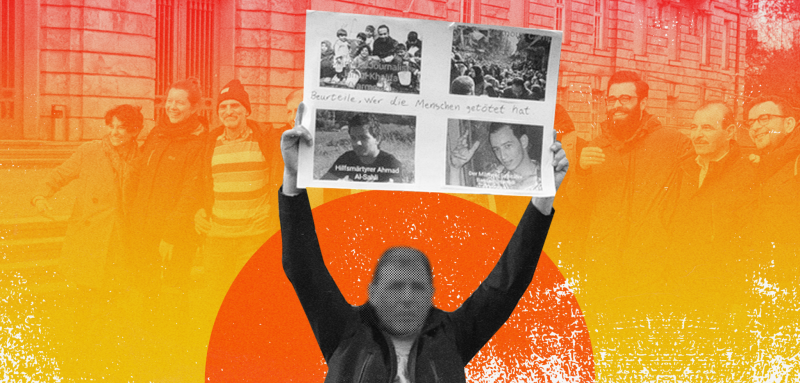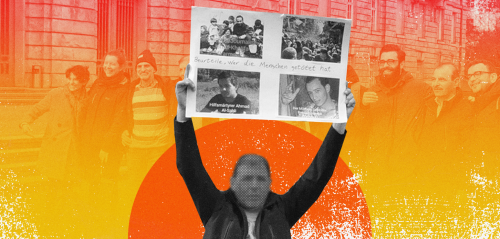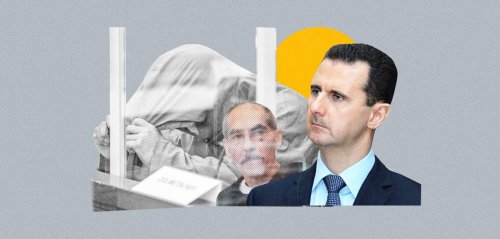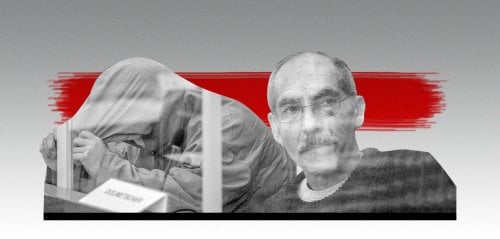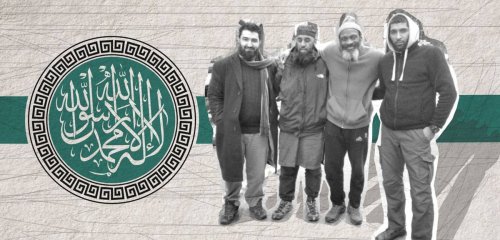When Judge Delia Neumann began reading a life sentence on Thursday (February 23rd) in Berlin against the accused Muwafaq Dawah, nicknamed the “Yarmouk Butcher” in Damascus, on charges of committing war crimes, Dawah broke a silence he had regularly maintained during the trial sessions that began last August. The defendant accused two plaintiffs sitting opposite him of being armed, cursed out an attendee, and raised his hand to the sky indicating that God is standing between him and them.
While the seats in attendance were unusually full for this trial, which garnered a huge following unlike that of the previous ones in the cities of Koblenz and Frankfurt, the judge continued to read out the verdict, speaking of how the accused fired a projectile from an anti-tank weapon at a crowd of people trapped in a camp plagued by a humanitarian catastrophe on March 23, 2014. The civilians were so desperate to the point that they risked their lives to go and get an aid fund she called the "death fund" because they were threatened with arrest, torture and death.
According to the court, Dawah was likely a member of the Free Palestine Movement and was in charge of one of their checkpoints. On the day of the incident, he was tasked with supervising the distribution of food boxes received from the United Nations relief agency UNRWA, when he saw a crowd of civilians, including women and children, gathering to receive them, and then fired a grenade at them without prior warning.
The court considered that "Muwafaq Dawah" committed the crime with nefarious motives, specifically to avenge his nephew, who was killed two days ago in fighting with rival factions
The court considered that Dawah committed the crime with "nefarious" motives, specifically to avenge his nephew, who was killed two days ago in a fight with opposing factions. According to witness accounts, he acted out of revenge by saying, "I will not leave any of you alive”.
The judge indicated the difficulty of the court's work and its reliance entirely on the statements of prosecution witnesses and experts in medicine, weapons and political affairs in the region, with their inability to reach the scene of the crime.
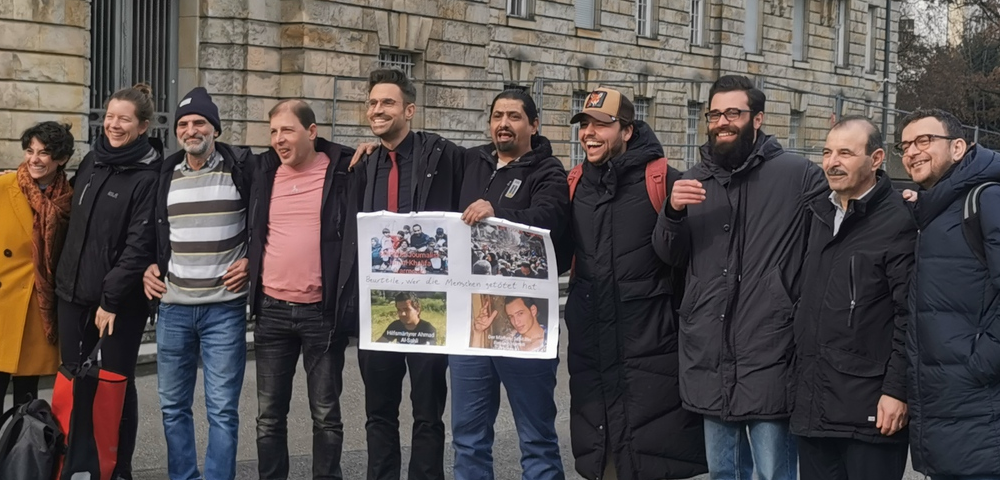
Prosecuting attorney Patrick Crocker, one of his clients, and Syrian lawyer Anwar al-Bunni, along with other activists standing in front of the court after the verdict was issued. Photography: Sulaiman Abdullah
The court's decision was based on what it could "verify with certainty". It spoke about the number of victims through rough approximation, using the expression "at least", and did not take into account the injury of a child mentioned in the statement of claim, as the court could not completely rule out his injury by an accidental shot.
Lisa Jani, a spokeswoman for the Criminal Court in Berlin, explained to Raseef22 that the defendant, a 55-year-old Syrian-Palestinian, was sentenced to life imprisonment for particularly serious war crimes, as well as four counts of murder, two counts of attempted murder, and causing grievous bodily harm, and the gravity of his crime of particularly severe guilt was established.
"The defendant was sentenced to life imprisonment for particularly serious war crimes combined with counts of murder and grievous bodily harm" – Lisa Jani, spokeswoman for the Criminal Court in Berlin
The court decided that he bore a particularly severe guilt, which means Dawah would not be eligible for parole or release after serving the minimum sentence of 15 years.
The court will later specify how long he would have to serve in prison before it will consider the possibility of verifying his conditional release. The security interests of the public play a particular role here.
The court justified ascertaining the gravity of the crime by the number of victims, who had arrived without protection in search of food, given the catastrophic humanitarian conditions in the camp at the time.
Outside the courtroom, one of the plaintiffs thanked the German judiciary, which he said had granted him the justice that was not possible in Syria, speaking of a true country of law in Germany. The families of the victims celebrated the verdict with personal prosecution lawyer Patrick Crocker outside the court building, while carrying photos of the victims.
A late defense attempt that failed
The defense, represented by lawyers Michael Booker and York Fratzky, followed a strategy based on questioning the clarity of the accounts of the prosecution's witnesses, constantly hinting at them being in contact with Anwar al-Bunni, director of the Syrian Center for Legal Studies and Research, trying to portray al-Bunni as the mastermind of the case and the one who coordinated the testimonies.
In her ruling Thursday, the judge ruled that it was "reasonable" for witnesses to communicate with al-Bunni, and "reasonable" that the center's method of collecting evidence was not similar to that used by the Criminal Investigation Office, and that the translation may not have been accurate and clear, but the same is true for them in this case.
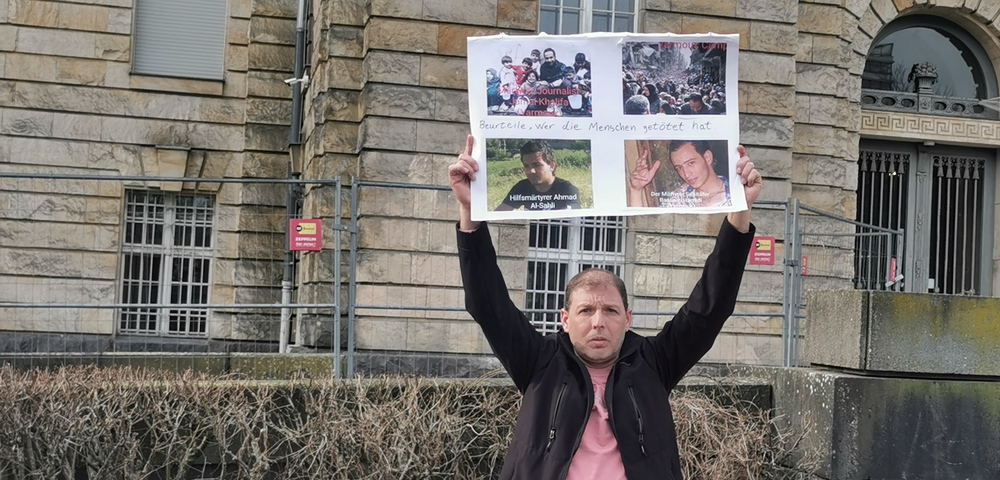
An activist from Yarmouk camp holds photos of the camp’s siege and two of the victims. Photography: Sulaiman Abdullah
In what appeared to be a desperate last-ditch attempt, the defense called witnesses who were Dawah's relatives to substantiate his claim at the end of the trial that he was not in the camp at the time of the crime, saying he was injured and thus was unable to commit such a crime.
The court confirmed that its conviction in his verdict was not shaken by the plaintiff's claim that he was not there, nor was it affected by the testimonies of the witnesses he summoned. It was also not convinced by copies of hospital records from Damascus claiming he was injured on the date of the crime, and could not have committed it, saying that the two injuries occurred in two periods far from the day of the crime, which makes it insignificant.
In its final plea, the defense pinned its hopes on questioning the witnesses' ability to see their client from that far a distance, calling for an expert to be summoned. In response, the court refused, justifying the refusal on several grounds, namely that the witnesses were not in a position to be able to calculate the distance Dawah was from them, and that estimating it is difficult and is related to the location of the observer from afar. The court also said that figuring out the distance does not require an expert, because the court already knows it, citing an example of players being able to see each other on a football field.
The court noted that Dawah, who arrived in Germany in 2018 through family reunification to live as a refugee in Berlin, considered returning to Syria before being arrested in 2021 and placed in pre-trial detention.
Speaking from outside the courthouse, prosecution attorney Crocker explained that Dawah would be given a month's notice to appeal, from the day the written verdict was received, and that the appeal would normally be limited to making sure there were no errors of law. In the case of a higher court such as the one that handed down the rulings, the likelihood of a success in a federal court appeal is usually low.
When asked for comment on issuing a more severe sentence than that of Anwar Raslan, Crocker said that he does not comment on the severity of the sentence, nor does he care how long he will spend in prison, which is something that his clients may see differently, but rather for him, the importance lies in holding the defendant responsible for the severe crimes that occurred. That is why he did not ask for a specific ruling in the final pleading.
He considered it important for the court’s reference, in its justification, to verify the gravity of his crimes (and thus imposing a harsher sentence than that of Raslan), in order to indicate that he had pointed his weapon at people suffering from starvation, and the only reason they were there was to get food as helpless civilians.
This is the third verdict handed down in Germany against a defendant affiliated with the Syrian intelligence services and loyalist militias, under the universal jurisdiction system.
In response to Raseef22’s question about whether he was disappointed that the court did not accept his request to consider Dawah’s actions a crime against humanity, instead of a war crime, Crocker said "yes," adding that this happened as a result of the federal prosecutor's investigation and the filed lawsuit, so he was not surprised that the court did not accept his request in this regard.
This is the third verdict handed down in Germany against a defendant affiliated with the Syrian intelligence services and loyalist militias, under the universal jurisdiction system. Former colonel Anwar Raslan was sentenced to life imprisonment and sergeant Eyad al-Gharib to four and a half years in prison in the German city of Koblenz in the past two years for crimes against humanity. Meanwhile, Dr. Alaa M. is still facing charges of a crime against humanity before a Frankfurt court.
Raseef22 is a not for profit entity. Our focus is on quality journalism. Every contribution to the NasRaseef membership goes directly towards journalism production. We stand independent, not accepting corporate sponsorships, sponsored content or political funding.
Support our mission to keep Raseef22 available to all readers by clicking here!
Interested in writing with us? Check our pitch process here!
